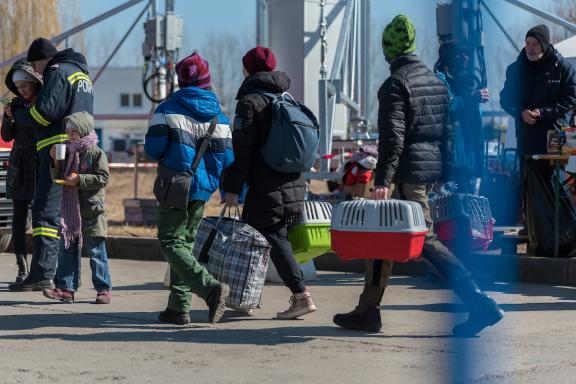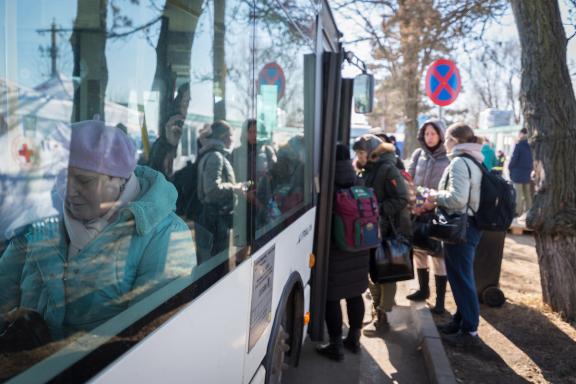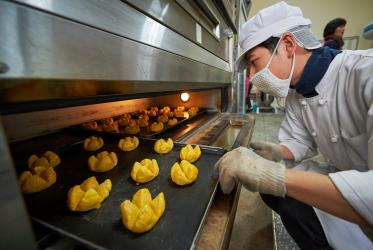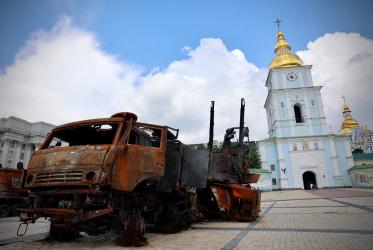Meeting with Hungarian Inter-Church Aid, the delegation visited refugee centers in Budapest, then held a roundtable with ecumenical partners in Hungary.
The group also visited the Ukraine and Romanian border to see the work done by Hungarian Inter-Church Aid in support of refugees.
The delegation also connected with Aidrom, making border visits and learning about the rapidly-changing needs of refugees.
The delegation was also received by His Eminence Father Iustin, bishop of Maramuresh and Satmar of the Romanian Orthodox Church, learning about the situation at two crossing points for Ukrainian refugees.
His Eminence Iustin explained to them that the Romanian Orthodox Church is very dynamically and actively involved in the reception and in taking Christian care of all those crossing the border into Romania, whether they stay or transition freely on the way to western countries. The Ukrainian refugees are provided with medicines, food, clothes, accommodation or guidance to destinations.

A family of refugees from Ukraine carry their pets as they arrive on the Romanian side of the Vama Siret border crossing, Romania. The Vama Siret border crossing connects northeast Romania with Ukraine. Located north of Siret and further in the south the city of Suceava, the crossing connects Romania with the Ukrainian village of Terebleche and further north the city of Chernivtsi.
An important facet of care at these crossing points comes from priests and volunteers who show love, warmth and generosity.
The Petrova Monastery is hosting more than 50 mothers with children for an indefinite period, providing accommodation, meals and other care. Through collaboration with the educational authorities and institutions, children are also given the opportunity to attend school and learn in their native language within the Ukrainian communities in the area.
The Romanian Orthodox Church is also joining many other Christians across the world in praying for peace.

A children's centre has been repurposed to host refugees from Ukraine, at a church compound in Milișăuți.
WCC deputy general secretary Prof. Dr Isabel Apawo Phiri said that meeting with refugees and those helping them was a sharp reminder of the appalling and escalating impact of the conflict in Ukraine on civilians. “The women, men and children of Ukraine are suffering from what appears to be ongoing indiscriminate attacks,” she said. “Hospitals, schools, kindergartens and residential areas—refugees are pouring forth from these spaces with firsthand stories of deep trauma.”
Peter Prove, director of the WCC Commission of the Churches on International Affairs, said that, as international humanitarian law continues to be disregarded, civilians are bearing the brunt of the conflict. “It is deeply disturbing to witness the effects of what may constitute war crimes and crimes against humanity,” said Prove. “Humanitarian aid groups and churches are unified in calling for a ceasefire and negotiations to end this tragic conflict.”
Rudelmar Bueno de Faria, general secretary of ACT Alliance, spoke on the second day of the visit, as the delegation met with Hungarian Inter-Church Aid. “At the airport, they have a welcome center and also, around Budapest, different places where they are providing all kinds of support for Ukrainian refugees,” said de Faria. “By today, you have more than 3 million refugees in neighboring countries, and we will be visiting and talking and checking how is the situation of them and the challenges they face in this war.”
More photos of the solidarity visit by ACT Alliance and WCC
Churches respond to growing humanitarian needs in Ukraine and bordering countries (WCC news release, 11 March 2022)
WCC appalled by escalating impact on civilians of conflict in Ukraine (WCC news release, 11 March 2022)
Patriarch Kirill responds to WCC acting general secretary’s letter urging voice for peace (WCC news release, 10 March 2022)
WCC acting general secretary to Patriarch Kirill of Moscow: “raise up your voice so that the war can be stopped” (WCC press release, 2 March 2022)
WCC urges President Putin to stop war, restore peace to Ukraine (WCC press release of 25 February 2022)
WCC statement: WCC urges to stop this war, and to restore peace to the people and nation of Ukraine (25 February 2022)
In Ukraine, “such a war has no excuse, neither from God, nor from people” (WCC press release, 25 February 2022)

A woman closes her eyes as she sits on the bus to Suceava from the Vama Siret border crossing, Romania. The Vama Siret border crossing connects northeast Romania with Ukraine. Located north of Siret and further in the south the city of Suceava, the crossing connects Romania with the Ukrainian village of Terebleche and further north the city of Chernivtsi.








